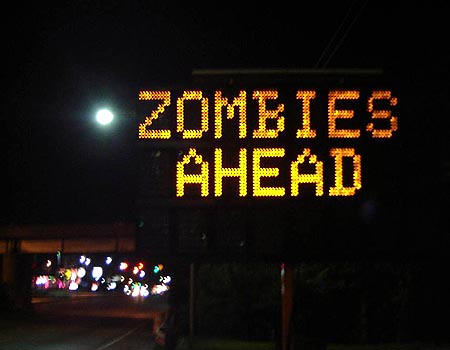 |
| Photo credit: *Keith |
Rodger A. Payne, "Laughing off a Zombie Apocalypse: The Value of Comedic and Satirical Narratives," International Studies Perspectives 2016; doi: 10.1093/isp/ekv026.
Kudos to Dan Drezner for making me think about this.
These are parts of Oxford's permission note:
Sending a free-access URL
There are several advantages to providing you with a free-access link to your article instead of a PDF file, including:
• Access to both the HTML and PDF versions of an article (where available).
• You (and your co-authors) plus any users of your own personal/institutional web sites will get free access to the finally published and authoritative version of the article that is available from our site whether or not they are a subscriber to the journal;
• We guarantee that you (and your co-authors) will have continued access to your article without the responsibility of maintaining and updating these files;
• All the linking and other functionality for the article remains in place;
• We can continue to gather accurate usage statistics for the journal to help us ensure that we continue to provide a good service for authors and readers.
Distribution of the link
You may wish to include these links in your list of publications. As with an offprint, following these links allows interested readers free access to the full text of your paper whether or not they are a subscriber to the journal. However, in distributing the link, we request that you consider the following points:
• The article should only be viewed from the Oxford Journals site, and not hosted by your own personal/institutional web site or that of other third parties, though you or your co-authors may post the URLs on your own sites or those of your institutions/organizations;
• Single copies of the article can be printed and distributed to interested colleagues who wish to use the article for personal research/study purposes only. For those wishing to make commercial use of the article, please direct them to journals.permissions@oup.com for permissions information or see the website.
Visit this blog's homepage.
For 140 character IR and foreign policy talk, follow me on twitter.
Or for basketball, baseball, movies or other stuff, follow this personal twitter account.

Congrats on the piece -- hopefully a book on zombies and comedies (and the critical potential of the genre against tragedies) is in the making. Two points that I might throw out there beyond your critique: 1. There is very little political economy in the zombie IR lit (that's ironic for its progenitor, Drezner, to have built his career on his sanctions dissertation). To a certain degree, Drezner's work proves attractive not only because it gives students something they already know (pop culture and zombies) to bridge into the unknown (IR theory, world politics), but because of its price point (at a tenth to a fifteenth of the cost of a normal textbook). The self reflection of its own placement in student practices, and the production of knowledge, seems off-limits even for what at times can be a very satyrical treatment of international relations and the existence of the field (for example, the inside joke about 2 by 2 charts as modes of explanation for so much of POS, or the career mom fighting zombies trying to have it all -- perhaps a statement of some individuals in the field). What political economy we get happens in limited quantity as it applies to liberalism for Drezner. This seems like somewhat of a domain problem -- which Wendt makes into an innocent thing that we just pick our objects of study (states, in his case), but Zeyfus suggests the very defining and picking of objects constitutes the politics and power of the objects themselves -- for Drezner and the nature of IR. 2. The broader nature of the boundaries of these categories of tragedies and comedies in the Greek sense -- and what they mean for politics -- amounts to some problematic boundaries for the nature of how we create subfields in POS. For example, Drezner looks at zombie catastrophe and affirms the possibility of survival under particular IR theories. Is there liberation any disaster? Generally there seems to be survival and the creation of new institution -- but not the creation of valor, virtue, art forms, new identities, counter publics, and great new civilizations. For example, consider that the Black church -- and its prophetic political tradition -- emerge under conditions of slavery in the US; blues, jazz, and rock music emerge in the pre- and Jim-Crow era. In catastrophe, there are tremendous potentials, as Cornel West would tell us. Or consider Zizek's critique of ecology -- that it does not affirm the possibility of disaster. Where would America be without the death of dinosaurs to provide us oil? Both Zizek and West raise the issue of disaster as a problem -- in so far as we rarely read the emancipatory potential into it, especially as creating these new things might foster more elites and tragic narratives or create a bridge to comedies. The Habermasian, I suppose, would look at the discourse rules and the socio-political restraints on them -- produced in these genres or narratives, but at times we need to step back and confront the hermeneutical structures at play when we approach these objects (and the potentials they possess).
ReplyDelete